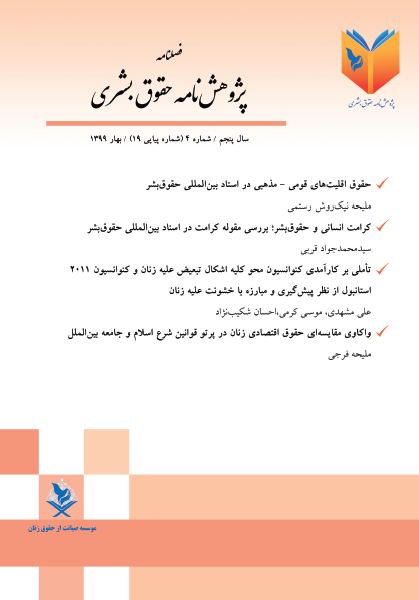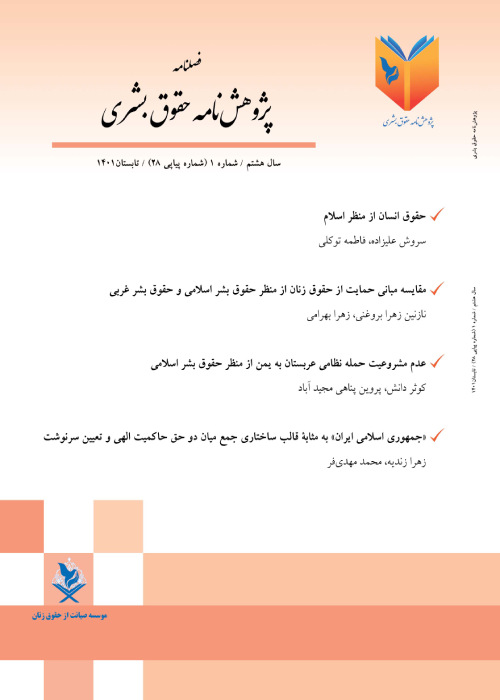فهرست مطالب

نشریه پژوهش نامه حقوق بشری
پیاپی 19 (بهار 1399)
- بهای روی جلد: 150,000ريال
- تاریخ انتشار: 1399/02/17
- تعداد عناوین: 5
-
صفحه 9
-
صفحه 13
اعلامیه ها و اسناد بین المللی حقوق بشر همواره بر ضرورت حقوق یکسان افراد تاکید داشته اند و اصل برابری مندرج در اعلامیه جهانی حقوق بشر، گواهی بر اهمیت رفع تبعیض از جامعه انسانی وتاکید بر این موضوع است که اقلیت های قومی، مذهبی و زبانی باید باتوجه به اصولی نظیر عزت، آزادی، برابری و حق مشارکت در تعیین سرنوشت، به حقوق انسانی خود دست یابند و هرگونه تبعیض نسبت به آن ها مردود است. مجموعه اسناد حقوق بشری بعد از جنگ جهانی دوم به موضوع اقلیت ها توجه داشته و تمام حقوق شهروندان عادی را برای اقلیت ها نیز مشروع می دانند.
باتوجه به اهمیت حقوق اقلیت ها در نظام های سیاسی چندفرهنگی، این مقاله درپی پاسخ به این سوال است که اقلیت های قومی و مذهبی براساس اسناد بین المللی حقوق بشر دارای چه حقوقی هستند؟ در پژوهش حاضر، نگارنده با استفاده از روش توصیفی و استناد به اسناد حقوق بشری، بیان می دارد که اقلیت های قومی و مذهبی، با دارا بودن حقوق چندوجهی، می توانند موجودیت، هویت، ارتباط، مشارکت، فرهنگ و ارزش های خود را حفظ کنند و دولت ها حق تعرض به آن ها را ندارند و همان گونه که اصل مشارکت سیاسی، اقتصادی و فرهنگی برای همگان مورد تاکید است، اقلیت ها نیز می توانند در عرصه های مختلف اجتماع به کنشگری بپردازند و حق تعیین سرنوشت به آن ها اجازه فعالیت سیاسی و حتی تاسیس حزب و انجمن را هم می دهد.کلیدواژگان: اقلیت های قومی، حقوق بشر، تبعیض، اقلیتهای مذهبی، مشارکت سیاسی، آزادی عقیده، برابری با اکثریت -
صفحه 61
یکی از ایده های اساسی در اسناد حقوق بشر، اصل کرامت انسانی است که بعد از جنگ جهانی دوم، در تمامی اسناد حقوق بشر به آن توجه و اشاره شده، ولی در خصوص معنا، مصادیق و رویههای قضایی و تفسیری آن، اجماع عمومی بین المللی وجود ندارد؛ لذا مقاله حاضر تلاش دارد با بهره گیری از مطالعات اسنادی – کتابخانه ای و روش تحلیلی- توصیفی، به بررسی مقوله کرامت انسانی درگفتمان حقوق بشر بپردازد. سوال اصلی مقاله این است که آیا مفهوم و اصول کرامت انسانی در اسناد بین المللی حقوق بشر، با مصادیق شرافت انسانی مغایر است؟ مفروض مقاله نیز این است که کرامت انسانی به مثابه یک اصل مهم در اسناد حقوق بشری، فاقد اجماع عمومی بوده و دلالت های معنایی مختلفی از آن در رویکردهای تفسیری حقوق بین الملل مشاهده می شود.
برخی یافته ها نشان می دهند که کرامت انسانی مبتنی بر اصولی چون آزادی، برابری، حق توسعه، امنیت و حراست از هسته بنیادین زندگی افراد، کیفیت زندگی و رفاهیات اجتماعی است و برخی اعمال در جامعه بشری با اصل کرامت، شان و عزت انسانی مغایرت دارند که از آن جمله می توان به شکنجه، تحقیر، تبعیض دینی و مذهبی، نقض حقوق زنان، بی توجهی به کودکان و اقشار آسیب پذیر، نفی حقوق سیاسی اقلیت ها و غیره اشاره کرد. این اعمال و رفتارها با اصل کرامت انسانی در تضاد هستند و اسناد حقوق بشر در سطح بین المللی و منطقه ای بر طرد این رفتارها توسط دولت ها تاکید دارند.کلیدواژگان: حقوق بشر، کرامت انسانی، اصل برابری، آزادی، تبعیض، امنیت انسانی، کیفیت زندگی شهروندان، حق توسعه -
صفحه 107
«کنوانسیون محو کلیه اشکال تبعیض علیه زنان»، یک معاهده حقوقبشری جنسیت محور است که بهمثابه یک سند حقوقی بین المللی الزام آور، قصد دارد معیارهایی را برای پیشگیری و مبارزه با تبعیض و زدودن تمامی اشکال آن علیه زنان ارایه دهد. از سوی دیگر، «کنوانسیون پیش گیری و مبارزه با خشونت علیه زنان و خشونت خانگی 2011 (کنوانسیون 2011 استانبول)»، نخستین سند الزام آور حقوقی در اروپا است که استانداردهایی را برای پیش گیری و مبارزه با خشونت علیه زنان فراهم آورده است، اما متاسفانه هر دو کنوانسیون بهعنوان ابزاری در راستای منافع سیاسی دول معرفی شده و نواقصی دارند. پرسشی که پژوهش فرارو، از رهگذر شیوه توصیفی- تحلیلی و با گردآوری منابع بهصورت کتابخانه ای، برای پاسخ به آن به نگارش در آمده، این است که کدامیک از دو کنوانسیون یادشده، یعنی «کنوانسیون محو کلیه اشکال تبعیض علیه زنان» و «کنوانسیون 2011 استانبول»، از نظر پیش گیری و مبارزه با خشونت علیه بانوان، کارآمدی بیشتری دارند؟ که بهنظر می رسد کنوانسیون تبعیض علیه زنان و نیز کنوانسیون 2011 استانبول و دامنه جهانی آن، بایستگی انعقاد یک کنوانسیون اختصاصی الزام آور در زمینه پیش گیری، کاهش و مبارزه با خشونت علیه زنان در چارچوب نظام سازمان ملل متحد را ندارد. خشونت علیه زنان، مسئله ای فراگیر و جهانی است و پیش گیری و مبارزه با آن نیز ابزاری متناسب و متناظر با خود را می طلبد. بنابراین راه حل کامل در مبارزه با خشونت، دیدگاه اسلام است که نویسنده در پایان با ذکر معایب این دو کنوانسیون، به نظریه اسلام اشاره میکند.
کلیدواژگان: خشونت علیه زنان، کنوانسیون محو تبعیض علیه زنان، کنوانسیون 2011 استانبول، حقوق زنان، حقوقبشر -
صفحه 137
خانواده در ادیان مختلف الهی از جایگاه والایی برخوردار است. در این میان، دین اسلام به عنوان کامل ترین دین، برای خانواده و در راستای تربیت مادی و معنوی انسان، نقش عظیمی قایل شده و به منظور پیشرفت و تکامل این نهاد عظیم، وظایف و حقوقی را منطبق بر استعدادها و توانایی های زن و مرد مقرر داشته است. یکی از حقوق مورد توجه اسلام، حقوق اقتصادی است که بر حسب تمایزات فطری و جسمی زن و مرد شکل گرفته و برخلاف قوانین غربی، مرد به عنوان مسیول تامین نیازهای مالی زن معرفی شده است. در این مقاله، پژوهشگر درپی پاسخ به این سوال است که سیستم حقوق اقتصادی زنان در نظریه اسلام و قانون مدنی ایران بر چه اساسی بنیان نهاده شده و و تمایزات آن با کشورهای غربی چیست؟ ضمن این که در مقاله حاضر، به منظور نمایان ساختن تبعیض موجود در حقوق زنان، به مواردی در حقوق غرب نیز اشاره شده است.
کلیدواژگان: خانواده، اسلام، استعداد، حقوق، اقتصاد
-
Page 13
International human rights declarations and documents emphasize the equal rights of individuals and the principle of equality in the Universal Declaration of Human Rights is a reason for the importance of eliminating discrimination against human society. The ethnic, religious and linguistic minorities must achieve their human rights in accordance with principles such as dignity, liberty, equality and the right to self-determination. Any discrimination against them is rejected and the collection of human rights documents after World War II has focused on the issue of minorities. All the rights that citizens enjoy are legitimate for minorities. Given the importance of minority rights in multicultural political systems, the article tries to answer this question; what are the rights of ethnic and religious minorities under international human rights documents? The author shows by descriptive methods and analysis of human rights documents that ethnic and religious minorities have multi-dimensional rights, but executive shortcomings and lack of enforcement guarantees have weakened the rights. The author also refers to Islam’s view on the rights of ethnic and religious minorities and Solutions to eliminate deficiencies.
Keywords: Ethnic Minorities, Human Rights, Discrimination, ReligiousMinorities, Political Participation, Freedom of Opinion, Equality -
Page 61
One of the basic ideas in human rights documents is the principle of human dignity, which has been mentioned in all human rights documents since World War II; but there is no general international consensus on its meaning, criteria, and judicial and interpretive procedures. In this regard, the article seeks to examine the issue of human dignity in the human rights discourse by using documentary-library studies and analyticaldescriptive methods. The main question of the article is as follows; Are the principles of human dignity in international human rights documents contrary to criteria of human decency? The hypothesis of the article is that human dignity, as an important principle in human rights documents, lacked public consensus. In interpretive approaches to international law, there are different semantic implications of it. Some findings suggest that human dignity is based on principles such as freedom, equality, and the right to development, security and protection of the fundamental core of people’s lives, quality of life and social welfare. And some actions in human society are inconsistent with the principle of human dignity, honor and dignity including torture, humiliation, religious discrimination, violation of women’s rights, neglect of children and vulnerable groups, denial of rights. These actions and behaviors are contrary to the principle of human dignity, and international and regional human rights documents emphasize the rejection of this behavior by governments.
Keywords: Human Rights, Human Dignity, Principle of Equality, Freedom, Discrimination, Human Security, Quality of life of citizens, right todevelopment -
Page 107
The Convention is a gender-based human rights treaty that, as an international legal document, seeks to set standards for the prevention and the elimination of all forms of racial discrimination against women. On the other hand, Convention on preventing and combating violence against women and domestic violence (Istanbul Convention 2011) is the first legal document in Europe that standards for the prevention and fight against violence against women; but unfortunately, both conventions have been introduced as tools for the political interests of the states and shortcomings. The method of this research is descriptive-analytical and data-collection approach is Library. This article answers that question which of the two conventions is most effective in prevention and fight against violence against women? The CEDAW is not as effective as the Istanbul Convention and its global scope, on preventing, reducing and combating violence against women within the framework of the United Nations system. The issue of violence against women is a pervasive and global. Therefore, the complete solution in combating violence is the view of Islam. In the end, the author explains the disadvantages of these two conventions and explains the theory of Islam.
Keywords: Violence against Women, Convention on the Elimination ofAll Forms of Discrimination against Women, Istanbul Convention 2011, Women’s Rights, Human Rights -
Page 137
The family has a high status in various divine religions. Islam believes that the family has a great role in the material and spiritual education of human. The family, which consists of the marriage of a girl and a boy, is completed with the birth of children. The Islamic religion has considered the duties and rights of the great institution to be in accordance with the talents and abilities of men and women. One of the important rights of Islam is economic rights, which are formed according to the natural and physical differences between men and women and it has made men responsible for financing women against Western law. In this article, in order to answer the question, what is the foundation and distinction of women’s economic rights system in the theory of Islam and the civil law of Iran and Western countries? The main description of the article is about Islamic law and civil rights and expresses some cases on Western law to expose discrimination in women’s rights.
Keywords: Family, Islam, Talent, Law, Economy


